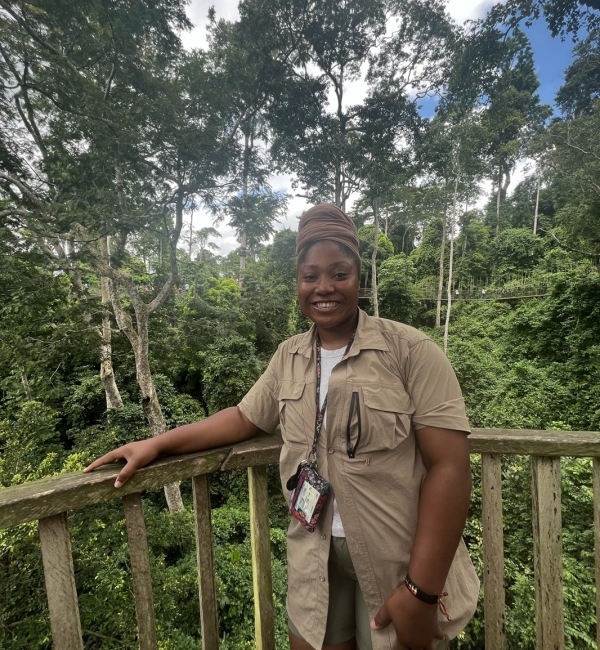Student blog: Investigating tuberculosis risk for Ghana's Fulani herdsmen
I’ve always been fascinated by tuberculosis research, particularly because it remains one of the leading causes of death globally. This ongoing challenge motivated me to center my focus on bovine tuberculosis (bTB) when applying for the CVM’s Expanding Horizons International Education program.
Thanks to my advisor, Dr. Jarra Jagne, I was connected with her colleague in Ghana, Dr. Anthony Akunzule, who was willing to support my proposed research project focusing on bTB in cattle in Greater Accra and its neighboring regions.
The Fulani community in Ghana, often referred to as one of the most mobile and distinct ethnic groups in Africa, has a rich history tied to pastoralism. Known for their deep connection to cattle herding, they primarily inhabit the rural areas of Ghana, often referred to as “the bush,” where they live in close-knit communities and engage in the management of large herds of cattle. These herds are not just a source of livelihood but also integral to their culture, with Fulani herdsmen passing down the knowledge of animal rearing and care through generations. A notable aspect of Fulani life is their consumption of raw unpasteurized milk directly from their cows, a practice that is deeply embedded in their traditions and daily routines. However, I was particularly interested in exploring the potential health risks associated with this practice, especially in relation to bovine tuberculosis. My project focused on understanding the possible transmission of Mycobacterium bovis, a bacterium responsible for tuberculosis, from the raw milk consumed by these Fulanis in the communities.
To study this, I traveled to the Greater Accra, Volta, Eastern and Ashanti regions of Ghana inhabited by the Fulani. During my fieldwork, I gathered milk samples from their cows (and small ruminants when possible), aiming to detect any evidence of M. bovis. After collecting the samples, I transported them to the Accra Veterinary Laboratory (AVL) of the Veterinary Services Directorate, which is headed by Dr. Theophilus Odoom. The laboratory has a BSL-3 facility where I performed DNA extractions and quantitative polymerase chain reaction (qPCR) testing. If any bacteria were present in the samples collected, this methodology would allow for the amplification and detection of its DNA.
Fortunately, after analyzing over 250 milk samples in the AVL, there were no positive detections of M. bovis, which is great news for the Fulani communities I worked with. However, it’s important to acknowledge that my research is still in its early stages. I was only able to collect samples from four of Ghana’s 16 regions, meaning much more data is needed for a comprehensive understanding of the scope of the disease. The Accra Veterinary Laboratory will continue to collect and test milk samples as resources allow, and I hope that this ongoing work will help Ghana’s Ministry of Food and Agriculture gain a clearer picture of the prevalence of bovine tuberculosis across the country.
At the outset of the project, I didn’t know much about the culture or people of Ghana, and I was thankful to have been welcomed both by those at the Accra Veterinary Laboratory and those I met while in the field. I experienced the importance of collaboration in conducting fieldwork, and through the help of my host, Dr. Akunzule, I encountered amazing people working within Ghana’s veterinary services in varying capacities who helped me collect milk samples and explain my research to the Fulani herdsmen.
While traveling to different regions of Ghana, I saw beautiful landscapes — from the rolling valleys to the expansive grasslands, and gained greater appreciation and insight into the Fulani’s culture and agricultural practices, including their breeds of cattle and methods of collecting milk. I quickly developed respect for their welcoming sense of community and developed a deeper sense of meaning to my project.
Furthermore, this experience has profoundly reshaped my perspective on food animal security. While the maintenance food animal health here in the U.S. has faced challenges, we are fortunate to have infrastructure and resources that help shield us from many of the diseases still threatening livestock in other parts of the world, like Ghana. Through this research, I came to understand just how critical food animal health is on a global scale. It is a vital aspect of veterinary medicine, one that I am eager to continue exploring and contributing to throughout my career. The Fulani community, with its close relationship to livestock, has left a lasting impression on me — emphasizing how the health of food animals directly impacts human health. I’ve come to recognize that there are countless communities around the world, each with its unique challenges, that require support to ensure the health of their livestock. It is my goal to help address these challenges and improve the well-being of both animals and people, no matter where they are.
This was a life-changing experience for me, as it allowed me to pursue my passion for One Health in a country where I have ancestral roots. This project would not have been possible without the amazing Expanding Horizons Program that Cornell’s College of Veterinary Medicine offers. Specifically, I am thankful to have received the Grant Cummings & Sons Externship Grant, in addition to an International Research Travel Grant from the Einaudi Center. I never thought I’d develop such a strong interest in global health and international veterinary medicine as much as I have, and I am thankful to the Expanding Horizons Program for affording me the opportunity to explore my budding passion and truly “expand my horizons.”






